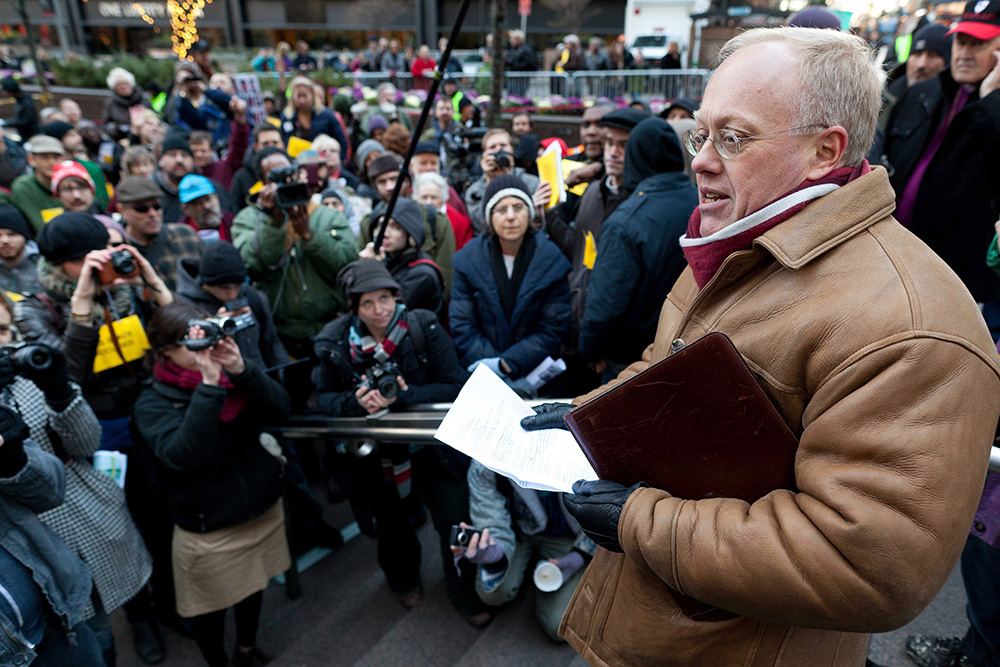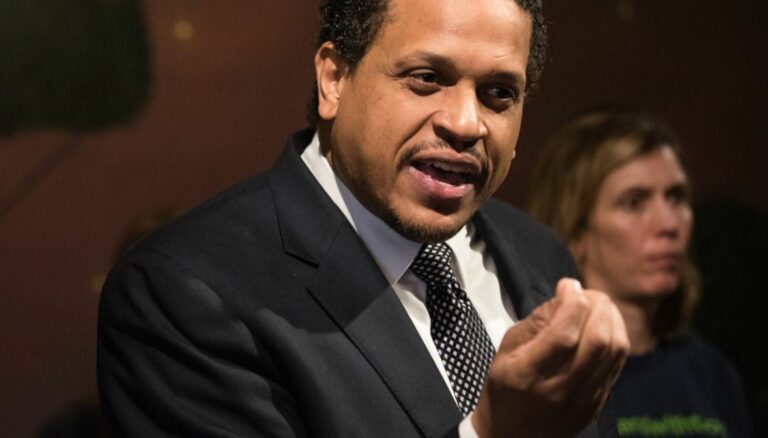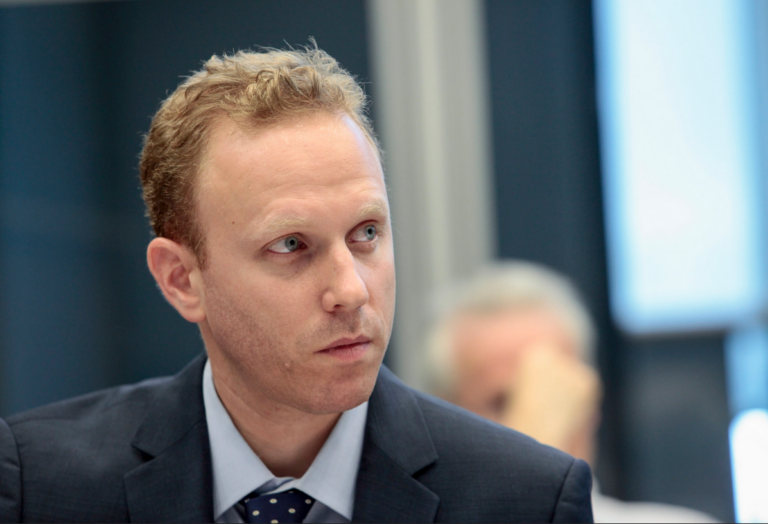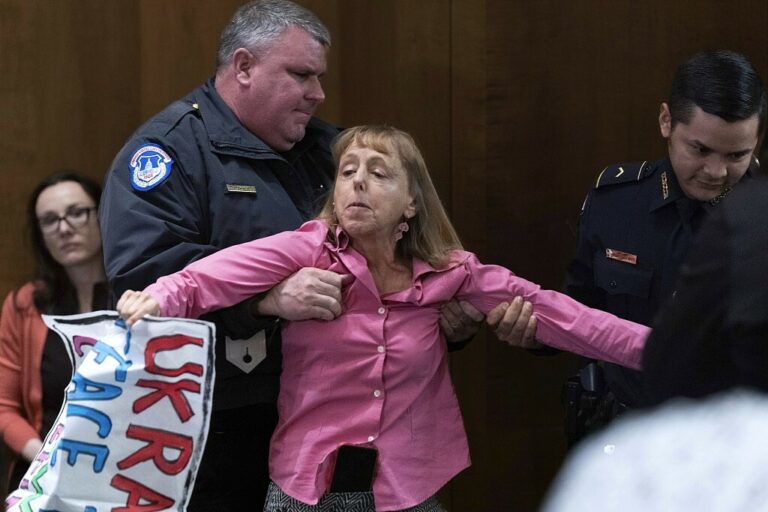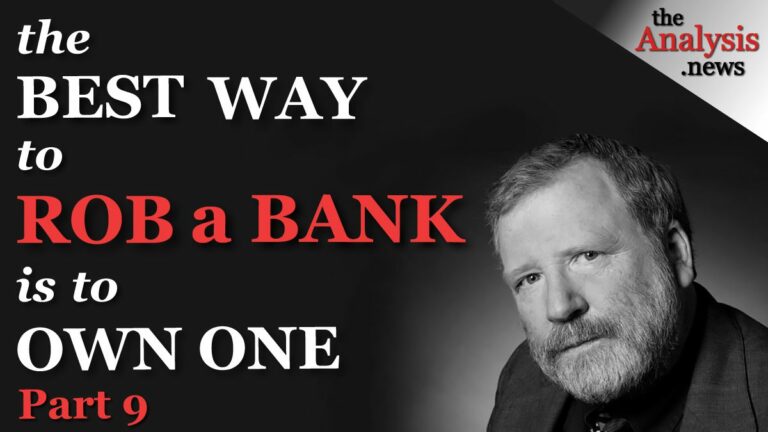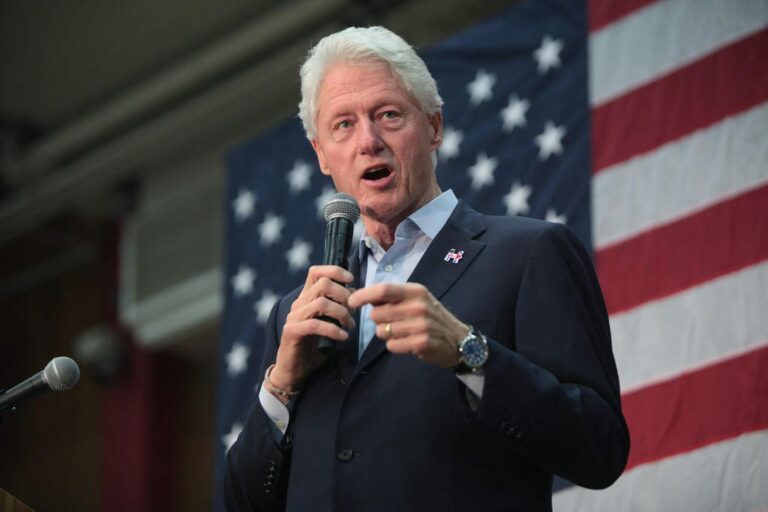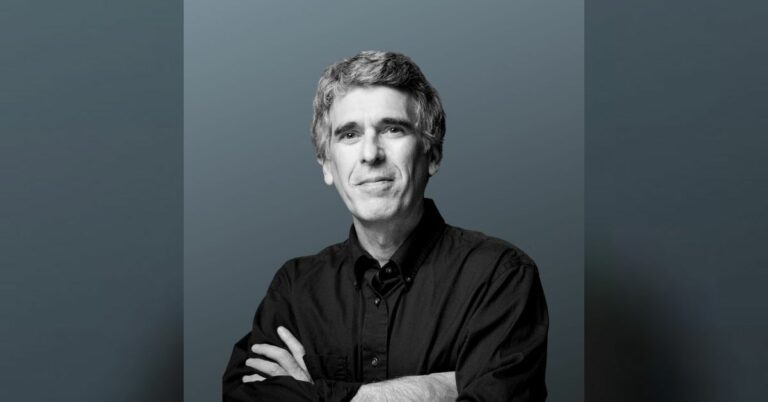Wages of Rebellion: The Moral Imperative of Revolt – Chris Hedges on RAI (pt 2/3)
This is an episode of Reality Asserts Itself, produced on July 7, 2015. On Reality Asserts Itself, Chris Hedges and Paul Jay discuss Ferguson, Baltimore and the need to build a movement with candidates that targets white supremacy and corporate capitalism.
PAUL JAY, SENIOR EDITOR, TRNN: Welcome back to Reality Asserts Itself on The Real News Network. I’m Paul Jay. And we’re continuing our discussion with Chris Hedges about his new book Wages of Rebellion. And Chris now joins us again in the studio. Thanks for joining us again.
CHRIS HEDGES, JOURNALIST, ACTIVIST, AND AUTHOR: Thank you.
JAY: So Chris is a Pulitzer Prize-winning journalist. His new book is Wages of Rebellion: The Moral Imperative of Revolt. What do you think, what do you make of the significance of the events in Ferguson and Baltimore, the Black Lives Matter movement? To what extent does it change American politics? In the broadest sense of the word politics.
HEDGES: Well, it hasn’t affected the engine of white supremacy at all and the ability of the state to exercise lethal force against people of color. So you have marches through the streets of Baltimore, marches through the streets of Ferguson, and they keep shooting people right and left. The Washington Post ran a piece a couple of weeks ago that said that the numbers were all wrong, that this figure that we’ve been using of a person of color being shot every 28 hours, in fact it’s at least two a day, because it’s all self-reporting. A lot of these police report departments don’t even report. And it’s symptomatic of a corporate state that is either unable or unwilling to respond to the most basic demands of its citizenry, which is not to be murdered in the streets of it cities. We watch fellow citizens being choked to death by police and those police never being charged. Most of us have seen that video of Garner. And that is symptomatic of a state that has been completely hijacked by an elite and doesn’t give a damn. So whether it’s the TPP, which we’re not allowed to read, whether it’s police forces that are allowed to kill indiscriminately, whether it’s wholesale surveillance, whether it’s the bailouts of Wall Street, which no one wanted–I mean, constituent calls were 100 to 1 against those bailouts when they were proposed in 2008. It doesn’t matter what we want. It doesn’t matter what our rights are. And Black Lives Matter and the protests in the streets of American cities against what is a long tradition of white violence, systemic white violence, whether outside the structures of power or inside the structures of power against people of color, and in particular African Americans, there is no mechanism to impede it.
JAY: How much has it affected, or do you think it might, the building of a movement in the United States, a resistance movement?
HEDGES: Well, it has affected the building of a movement, because I think it’s making people ask those questions. What does it mean to have a black president? What does it mean to live in a system where 25 percent of the world’s population are in cages–of the prison population? We have 25 percent of the world’s prison population, so 2.3 million Americans in cages. Roughly half of them never committed a violent crime. And then even those that did purportedly–I mean, you don’t even know, because only 94 percent of–or, excuse me, 94 percent of people never go to trial, so only 6 percent of cases ever even reach the courts, and they punish them because they didn’t plea out. So when I teach in a prison, and the people who have the longest sentences are usually the ones who said, well, I didn’t do the crime; they go to court because if everybody went to court, the system would collapse. It’s not designed to actually carry out trials. So I think it is. You know, you see in places like Baltimore and Ferguson activists beginning to ask questions about power and not being fooled by the manufactured personalities, whether it’s Barack Obama or anyone else, that are tossed out there, which is a form of anti-politics, because it’s all about creating these personalities that we empathize with or feel good about in voting for them. It has nothing to do with politics. So I think that it’s symptomatic of a growing radicalism. You see it within the anti-fracking movement. You see it with the push to raise the minimum wage. I think that there’s a growing political sophistication of which Black Lives Matter is a part.
JAY: I’ve talked to activists in Ferguson, and of course in Baltimore [incompr.] a lot of the similar conversations, although the Ferguson thing went on longer. And many of the leading activists, they’re wondering, well, what’s our second act? You know, there’s only so many times you can go out and fight the cops. And the truth is, there wasn’t that many people out there fighting the cops. I mean, it never became tens of thousands or even thousands. It was hundreds, and then often less than 100. And the confrontation with the police, while it helped spark–and one of our own producers here I think said it really well. Like, she was out there shooting when the rock-throwing in Baltimore was going on, and she talked what a liberating feeling it was for people out there (and I think she meant for herself too; she’s not supposed to say that, ’cause she’s a journalist, but she did), that all of a sudden there was a reverse, that you could actually throw something at the cops, instead of just having the shit beat out of you every other day. On the other hand, it has to go somewhere or at peters out. And that’s the great fear of the activists in Baltimore and Ferguson, that eventually you can’t sustain just the confrontational side. Now, in Baltimore it was a little different, because they actually had a kind of a small victory, but was a victory where the state’s attorney actually charges the cops. And I don’t think anyone doubts that there would never have been those kinds of charges if it hadn’t been for what was going on in the streets. It was a concession. We don’t know yet what will happen with those trials, and this all may blow up again. But the issue of how to sustain it, what comes next. And then one of the issues is, what is the relationship of the movement to electoral politics, because the fear of people in Ferguson particularly, but here, too, is if you too soon get involved in these electoral politics, so what? So you elect a few people, and they can’t really do much, ’cause it doesn’t–a few people elected, no matter how good they are. On the other hand, if at some point you don’t deal with power and who has power, at best you might get a few concessions, but you’re never going to really transform, for example, the police force. If you really want to transform the police force, you’ve got to be able to have power over the police force.
HEDGES: Well, that’s the issue. I mean, we had our movements taken from us in the name of anti-communism, and there’s nothing left. And even if relatively good people are elected to office, unless there’s pressure from movements, nothing can be done. So we have to rebuild those movements with a political sophistication that understands that the enemy is corporate power. It’s not the Baltimore Police Department, as venal as they may be. But it is a system of corporate capitalism that is engineering a society where a rapacious, tiny, narrow elite has all economic, political, social, cultural power and is exercising that power at our expense. But we’ve started down that road. But I think it entails a kind of broader critique and understanding of the infusion of white supremacy into structures of power. I mean, what the police are doing on the streets of our cities is in essence a lynching, more than one a day. I mean, day after day after day, primarily black people are being lynched, just like they were in the Jim Crow South, just like they were when they were marched off to the turpentine camps in Florida in convict leasing and never came back because they died in the swamps, just like slavery. So I think that there is a kind of breaking with the very sophisticated but very mendacious political narrative that, up until Barack Obama, was quite effectively used by the state. But I think that Obama has become a kind of watershed. I don’t think they’re going to be able to sell us this again. Hillary Clinton is trying, but I don’t think it’s going to work.
JAY: Yeah. I mean, even Obama has to stop his we’re in a post-racial society kind of language in the face of all of this.
HEDGES: Yeah. Yeah. I mean, Obama–I mean, Obama–.
JAY: Going back to his Reverend Wright speech, he ridicules Wright as being stuck–foot in the old way of thinking or something.
HEDGES: Right. Right. I mean, Obama has been kind of cornered by events. But he’s still appallingly cautious and careful, and refuses to even concede the existence of structures of power driven by corporate predatory forces and white supremacy that really at this point define the state. A mean, you may have black police officers, but look at the heads of all these police unions. These are just white hate groups. That’s all they are. And I think that activists are beginning to see and to ask those questions. I just spoke with the three leaders of the Free Alabama Movement that 18 months ago shut down three prisons in a work stoppage, for which they have now been sitting in indefinite solitary confinement, deprived not only of a television, but even reading material like magazines day after day in these isolation cells.
JAY: Well, how do you–I mean, I kind of know ’cause you told me off-camera, but how do you talk to them?
HEDGES: Well, without getting into specifics, there are contraband cell phones that circulate in those prisons. It wasn’t approved by the prison authorities. But they fully understand. They said, they were saying, don’t protest in front of statehouses. These people are all bought off. If you want to have protest, protest outside prisons while we’re inside trying to shut down the prisons through work stoppages, because just like the wider society, it’s all about neo-slavery, it’s all about profit. And if the state had to pay fair wages to those who work–and prisoners run those prisons–or had to bring in compensated labor, the entire prison system in the United States would collapse, because it’s designed as a form of neo-slavery and it’s designed to enrich a host of corporations that run the commissaries and the private phone service and the money transfer service and the medical service and the guards union, and along with all the contractors. And so they certainly understand, I mean, the most oppressed of the oppressed, that this is a battle against corporate power. And until we break corporate power, nothing will change. And I think that consciousness is becoming part of these new resistance movements.
JAY: In some of the activists I’ve talked to in different cities, and in Baltimore particularly, there is a kind of sense that it’s about white power is the enemy, less than corporate power is the enemy, that the ideology of white supremacy is more the enemy than the system of capitalism or corporations, not that they don’t have an analysis of how the economy works and who has access to capital and who doesn’t. It’s not without some economic analysis. But it does end up that black-owned businesses, more a private sector solution, some change in public policy, but towards building black institutions, that’s really the way to go, ’cause they have zero faith that the white working class will ever do anything progressive.
HEDGES: Right. But black-owned businesses, once they become successful, have a habit of selling out the black underclass. And that’s what we’ve seen. So for the upper, let’s say, 25 percent, 20 percent of African Americans who have been integrated into the economic system, life is okay. But for the 70 or 80 percent of African Americans who have been left stranded in a kind of postindustrial America, life is worse than when King marched in Selma or Memphis or anywhere else. And there’s been a betrayal by black elites, which has replicated the long betrayal of white elites, who are quite willing to kind of turn the other way when they’re doing okay. And that is a question of capitalism. It’s a question of human nature. It’s kind of beyond race. But I think Obama represents precisely this figure. I mean, his wife was a corporate lawyer. He will leave the White House in 16 months and become a multimillionaire the way the Clintons are multimillionaires. They kind of got their own. But I certainly see within the prisons and I see among Ferguson activists that they get it. I mean, in this article I wrote on the Free Alabama Movement, which is called “America’s Slave Empire”–
JAY: This is in Truthdig.
HEDGES: –yeah–they talk about Obama and they talk about how he is part of this system, this business elite, and he profits from it at their expense, and that once you look at it like that–these are their words–it doesn’t matter whether the president is white or black.
JAY: You get to go all over the country, all over the continent, even the world, but traveling around the United States particularly, how much do you see is there organizational forms emerging, or that exist, where you have black and white activists in broad fronts dealing with the situation? It’s interesting in Baltimore that about three, four days into the week–and they call it the Baltimore uprising; I think it’s better to call it the Baltimore resistance. I don’t think it quite met the bar of an uprising. But whatever. But about three or four days into the week, protests started–white students started joining, and it got to a point where there are hundreds, and I think it may have been at some point several thousand white students, or white youth, at any rate, joining black youth in the streets. But there’s no real organizational form now that that upsurge is over that expresses that. And I’m wondering if you’re seeing around the country any place where it might be?
HEDGES: Well, I just came from Seattle, so I helped Kshama Sawant kick off her campaign. She’s a socialist city councilwoman. And there you have a party, Socialist Alternative, that has formed within the city. We don’t have many of those yet, but that’s precisely what we’ve got to do. We have to build political organizations that are expressions of movements, but movements are key. And as I think we spoke off-camera before, even when representatives from that political entity achieve power, those movements have to remain alienated, because they need to put pressure even on their own to react. I mean, we’re watching that in Greece with SYRIZA, and maybe with Podemos if they achieve power in Spain. So I think that the primacy is to build movements, but those movements are going to go nowhere unless there is a political vision and unless there is a political entity that gives expression within the system to that vision. And Kshama and I have spent many hours speaking about how do we do this on a national level. I worked with Nader in 2008 in his last election, and so I saw up close all the ways that they throw roadblocks up for a third-party candidate, which are very dirty and very costly and very underhanded, really making it pretty much impossible for a third party–
JAY: At a national level
HEDGES: –at a national level. And yet do you still try and build some kind of expression so that the word gets out there, with the understanding that that political entity is meant to feed the movement, not to hold an election and then go home and it’s an end in and of itself? And some people have criticized Ralph for not doing that. But I think she’s right. Think there needs to be a political–I mean, SYRIZA ten years ago was only polling 4 percent. And we do need it somehow. I mean, we’ve toyed with the idea of, like, getting money and renting an abandoned farm, because you want to do something like the Freedom Movement, where people who don’t have economic means participate and have–going up for three days and putting up tents and writing up a socialist agenda that everyone approves, and maybe even proposing a candidate. I don’t know. But we need something like that on a national level.
JAY: Well, it seems to me what’s happening in Seattle, and to some extent you could see it in Jackson, Mississippi, for a while,–
HEDGES: And Richmond, too.
JAY: –and Richmond, it’s at the city level where there’s a possibility for real breakthrough.
HEDGES: No, it’s local. Right. So, I mean–and you have that in Baltimore.
JAY: And maybe some small states after that.
HEDGES: Right. Well, you’ve got to start local. That’s just what she’s done. Now, what you’ve seen in Seattle is the Democratic establishment nationally is throwing everything they have to destroy her, which is, of course, what happened with Nader. It was the Democratic Party that after 2000 set out and I think effectively destroyed Nader or marginalized Nader. And that’s what they’re doing to Kshama, because they don’t–because she exposes them for what they are in the way that–and I’m not a supporter of Bernie Sanders, but–on many levels; we can start with Palestine and–but he is exposing Hillary Clinton for what she is. And that may be far more devastating to the Clinton campaign than they realize. I mean, Hillary Clinton is trying to run like Barack Obama. And this is always the problem. You know, it’s like it’s all those old generals who fight the last war instead of the first war. It’s how the French lost World War II. And Obama worked because he was a nonentity. Nobody knew who he was. He was able to build a grassroots enthusiasm while sucking down in 2008 more money from Wall Street than his Republican rival. Clinton I don’t think can do that. So I think, yeah, I think the real inroads we will make is local. I know that’s why you’re here. It’s why you should be here. It’s where the hope is. And yet, on the other hand, let’s say the global financial markets crash again, which I think is kind of an inevitability. I’m not predicting when, but it’s not a sustainable system. When that happens, you don’t want to be reactive. You want to be ready. You want to have something there as an alternative. So I would say, yes, put up a national movement, a national expression of a radical kind of socialism, so that when things go down, you already have an address.
JAY: Okay. We’re going to continue this discussion with Chris Hedges on Reality Asserts Itself on The Real News. Please join us.
“Christopher Lynn Hedges is an American journalist, Presbyterian minister, author, and commentator. In his early career, Hedges worked as a freelance war correspondent in Central America for The Christian Science Monitor, NPR, and Dallas Morning News.”
